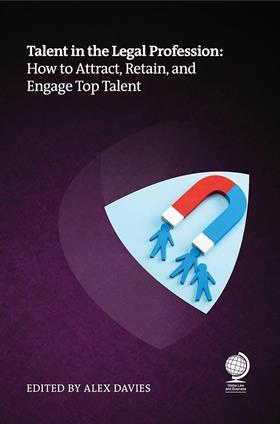Talent in the Legal Profession: How to Attract, Retain and Engage Top Talent
Edited by Alex Davies
£149, Globe Law and Business
★★★★✩
The 21 contributors to this work include magic circle talent decision-makers, in-house lawyers, consultants and young lawyers, from the UK and US.
This is a useful book for practitioners to dip in and out of. Most chapters include references, so you can dig deeper. It is interesting to read ‘from the horse’s mouth’ interviews with young lawyers. Lateral lessons from other markets outside the law are covered too.
Among the areas featured are: burnout and wellbeing; succession planning; the new qualification regime; how the law is less appealing as a lifelong career choice than it used to be; the importance of friendliness, purpose and work-life balance as a career-driver for younger lawyers; and how working from home makes it easier for lawyers to have conversations with recruiters and attend interviews online. The book also looks at the role of employer branding; the employee value proposition; culture; the impact of technology; and reward and skills development.
However, the book could be improved. Diagrams and graphs would make it more visually impactful. And an index at the back would help the reader to access the specific information that interests them. What is more, there is some topic overlap across the chapters.
Covering the following subjects in any future edition would add value:
- How embracing portfolio careerists would help to retain talent;
- The impact of Gen Z and Gen Edge’s different attitudes and beliefs on firms’ shifting talent policies;
- How platform law firms are threatening the retention of top talent by traditional law firms;
- A profile of the new generation, Generation Alpha, born after 2010 – their beliefs, motivations, needs and wants;
- The best way to train leaders to attract, retain and engage the talent of the future;
- Which professions are currently attracting the top talent that the legal profession wants and how this can be addressed;
- Qualitative interviews and quantitative data with insights about what attracts talent to the profession and what issues cause talented people to leave.
In a world where up-to-date information on a topic can be accessed via AI, books need to work hard to stay on the shelf.
Rachel Brushfield is ‘The Talent Liberator’ and founder of EnergiseLegal. She is also a published author
Talent in the Legal Profession
★★★✩✩
Would you advise a young person to follow you into the legal profession? Perhaps a member of your family? Your answer probably depends on your own career experiences. But I imagine that many of us would think twice.
I may be wrong. The law is still fascinating and important to society but the profession is facing many challenges. It does not have the cachet it once did. A legal career is interesting, but not always lucrative; study is expensive; and the work can often be stressful.
Perhaps this explains why recruitment is increasingly difficult. There are fewer candidates for positions at all levels. This is most evident in firms that rely predominantly on legal aid work, where the average age of fee-earners keeps climbing. Few students have any interest in this type of work. Candidates want security, and the lifestyle and benefits that only larger organisations and other careers can offer.

We have all worked in or known firms that struggle to keep staff, and others where employees spend their whole careers. A rapid turnover of fee-earners is not good for the firm or the client. Professionals who serve for generations in communities supply something special.
This book examines how to get the best candidates – and then how to keep them. It also examines how, post-Covid, more people want to work at home and are used to flexible working. And how will AI alter work?
The traditional career is changing and candidates seem to want to interview the employer, not the other way round. Most people in the profession change firms more frequently in the early years of their career before settling down – but will that change? Entrants now are more likely to change careers completely in their middle years.
So, what are we to do? With the profession changing, there are many different approaches to working, including the new boutique and specialised firms. We need to offer better opportunities and be more accommodating at different times of people’s careers. There is a good section in this book on the ‘motherhood penalty’, a telling expression. I recall a firm where I was told a solicitor was very well thought of, but also that she was not partnership material as she wanted a family.
The profession also needs a fair recruitment policy to attract and retain the best staff. Entrants may no longer want or be able to have a lifetime career. The profession needs to continue to serve the community by being representative. This book is an excellent guide.
David Pickup is a partner at Pickup & Scott Solicitors, Aylesbury
































No comments yet